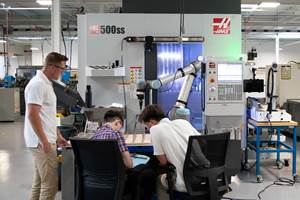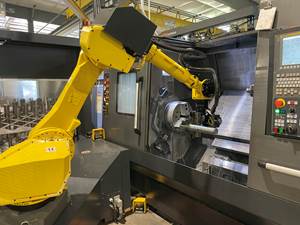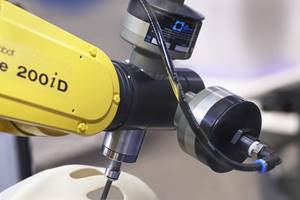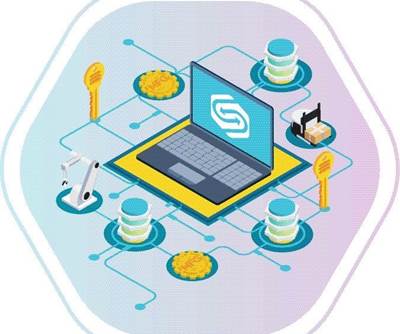Manufacturing Blockchain Adoption Accelerates
A recent partnership exposes more CNC machining businesses to a technology that could automate the front office.
Share




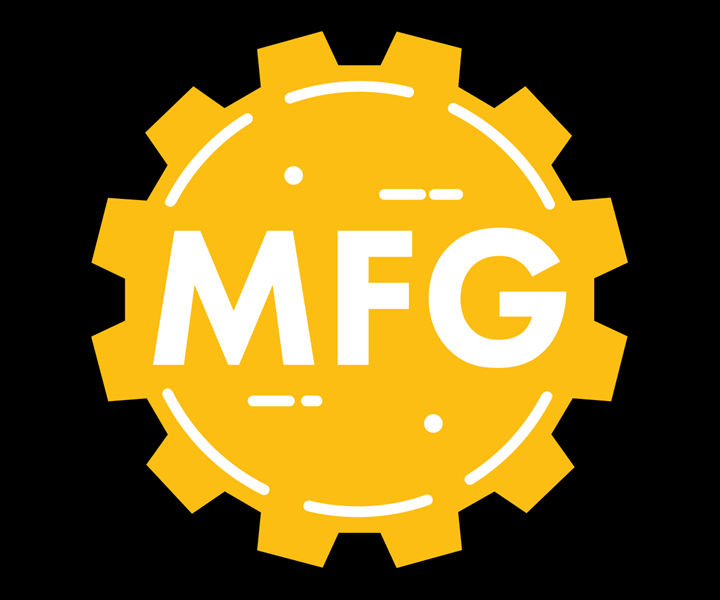
The MFG Token is a cryptocurrency dedicated specifically to fueling Syncfab’s blockchain. It can also be used to reward manufacturers for quoting work, even if they don’t win the job.
Do you wish it were easier to fill open machining capacity with profitable work? How about being among the first to leverage an emerging technology that could shape the future of manufacturing?
These are the kinds of questions that the National Tooling and Machining Association (NTMA) has been asking members, most of which are small- or mid-sized machine shops, in recent polling. The intent is to gage interest in quoting jobs online through a free-to-join network developed by NTMA partner SyncFab. What makes this platform different is its reliance on blockchain, the technology underlying Bitcoin and other cryptocurrencies.
Although SyncFab has its own cryptocurrency, purchasers posting requests for quote (RFQs) to the network pay for machined parts in U.S. dollars (via wire transfer). Manufacturers, meanwhile, see only jobs that have already been determined to be a good fit based on capacity, capability, certifications and other qualifying data submitted to SyncFab. In addition to eliminating much of the need for manufacturers to vet work, this system eliminates the need for parts purchasers to vet manufacturers. All that matters is the favorability of the terms, whether the quote is from a 10-spindle machine shop down the street or a larger manufacturer in another state.
However, SyncFab’s ambitions extend well beyond online matchmaking. By rooting its network in blockchain, the company eventually hopes to automate virtually the entire front office. “The big thing holding up smart manufacturing and the IIoT (Industrial Internet of Things) is, how do we share data between different entities in a way that establishes trust and security?” explains Dennis DelGado, chief design officer at SyncFab. “Blockchain will help free up siloed company data over a secure network that is built for validating and sharing all that information.”
A blockchain is a decentralized database. That is, all users maintain a copy of the data rather than storing it on a central server. Although everyone has a copy, the data is encrypted to all but authorized parties, and this security comes without the inefficiencies associated with passwords, firewalls or other traditional protection tools. These are unnecessary because breaking into or tampering with blockchain records is inherently (and exceedingly) difficult. Doing so would require hacking not just one central system, but the majority of the “nodes” sharing the database. This structure also makes it impossible for information to be out of date, and it provides a means of verifying data as part of its entry into a blockchain.
In short, blockchain data are unquestionably accurate, up-to-date and secure. These characteristics make the technology ideal for its original function: a means of recording and verifying cryptocurrency transactions without a bank or any other mediating, arbitrating central authority. Growing with every transaction, a blockchain provides an unbreakable, unquestionable audit trail that enables everyone to trust one another. And when barriers to trust break down, so do barriers to automation.
This is significant for manufacturing because a blockchain can be far more than just a bank ledger. It can also be a means of storing and sharing anything from financial records to inspection reports to 3D CAD files. The automation comes in the form of simple computer programs called “smart contracts” that use blockchain data to perform specific tasks related to accounting, job and part tracking, logistics and more.
SyncFab’s smart contracts are still in development, but their potential is vast. For example, a smart contract might dictate that payment for work be rendered immediately and automatically upon receiving an approved part inspection report. The fulfillment of that smart contract might trigger the execution of another initiating shipment of the parts by a third party. Upon the customer’s receipt of the parts, that third-party company would be paid automatically when yet another smart contract executes. Reordering would be simple for the parts purchaser, because all the relevant job data is already in the blockchain. For the manufacturer, there would less need to maintain inventory, as well as less delay from the time a job is complete until the time payment is received.
One critical step toward achieving this vision is incorporating smart contracts to help automate initial matchmaking, which is currently managed by SyncFab. With no need to act as a direct intermediary, the company will focus on growing the network, gathering more data, and doing the intensive development work required to make the kind of automation outlined above a reality.
As for the NTMA, the value of association membership is expected to increase as SyncFab’s network grows. This is because data collected during the vetting process can help the NTMA develop better services. For example, say the aggregate data reveal a rising proportion of members adopting a certain type of technology. This insight could lead the association to partner with businesses specializing in helping manufacturers integrate that technology. The hope is that this will provide extra incentive for members willing to help take the first steps toward realizing the potential of this emerging technology.
Related Content
CNC Machine Shop Honored for Automation, Machine Monitoring
From cobots to machine monitoring, this Top Shop honoree shows that machining technology is about more than the machine tool.
Read MoreSame Headcount, Double the Sales: Successful Job Shop Automation
Doubling sales requires more than just robots. Pro Products’ staff works in tandem with robots, performing inspection and other value-added activities.
Read MoreInvesting in Automation, Five-Axis to Increase Production Capacity
To meet an increase in demand, this shop invested heavily in automation solutions and five-axis machines to ramp up its production capabilities.
Read MoreHow to Accelerate Robotic Deburring & Automated Material Removal
Pairing automation with air-driven motors that push cutting tool speeds up to 65,000 RPM with no duty cycle can dramatically improve throughput and improve finishing.
Read MoreRead Next
A Characterization of Blockchain Technology
If you are not an information technology person or an accountant, you may be struggling to figure out what blockchain technology is all about. Here’s a simple way to understand it.
Read MoreCan Blockchain Help Machine Shops Win Work?
The record-keeping system underlying cryptocurrencies like Bitcoin could automate the front office, secure intellectual property and plug data-driven manufacturers into increasingly data-driven supply chains.
Read MoreSetting Up the Building Blocks for a Digital Factory
Woodward Inc. spent over a year developing an API to connect machines to its digital factory. Caron Engineering’s MiConnect has cut most of this process while also granting the shop greater access to machine information.
Read More
























